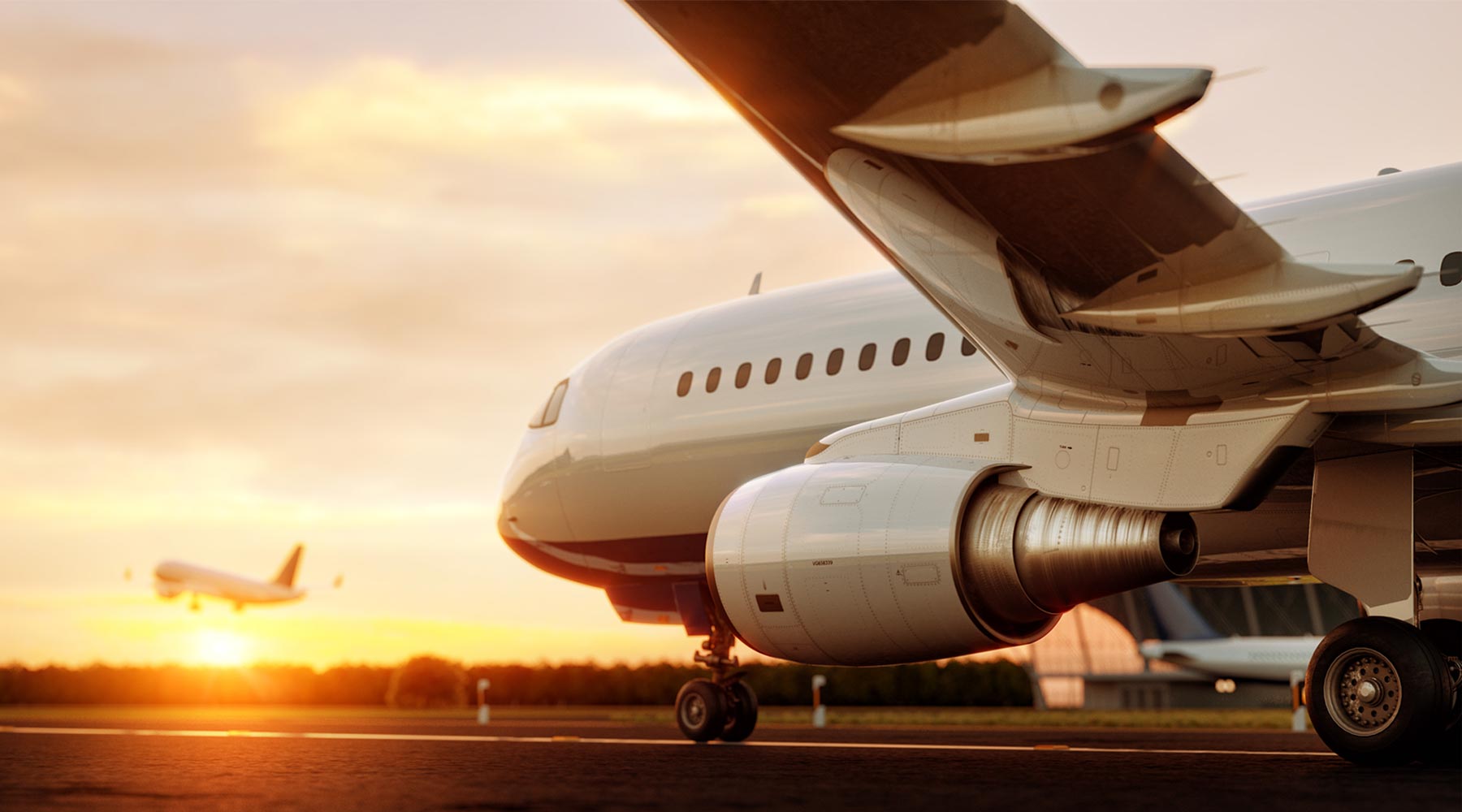The charm of the Greek islands with their deep blue sea and coastal lines clipped by the sun has attracted visitors from all over the world. But that is just the ferry schedule; sometimes, more is required to navigate through the vast archipelago and the mainland. Selecting the right airline can make a big difference between a stressful Greek adventure and a stress-free one. To assist you in reaching the apex of Hellenic travel with maximum convenience, we have made a thorough comparison of the top 10 Greece airlines. From local Greek airlines to national carriers, this guide reveals the best ways to reach your island hopping and mainland trips so that your flight is as stunning as the destination.
✈️ Flight Tickets to Greece
Greece’s unique geography, with its mainland and numerous islands, makes air travel an important and convenient way to get around. Over the years, Greece has developed a mix of full-service carriers, regional airlines, and charter operators that connect the country domestically and internationally. Below, we present the top 10 currently operating Greek airlines (focused on scheduled commercial carriers) ranked by fleet size, destination network, safety record, customer reviews, service quality, pricing, punctuality, and onboard offerings. Each airline’s history, hubs, routes, fleet, and service classes are detailed, along with recent updates from official sources.
Aegean Airlines

Aegean Airlines is the flag carrier of Greece and the largest Greek airline. Founded in 1987 (operations began in 1999), it started as a regional carrier and later expanded rapidly. In 2010, Aegean merged with the former national airline, Olympic Air, solidifying its leading position. Aegean became a member of Star Alliance in 2010, connecting it to a global network of partner airlines. The airline has consistently won awards, including being named the Best Regional Airline in Europe multiple times. Its main hub is Athens International Airport (ATH), with secondary hubs at Thessaloniki and Larnaca.
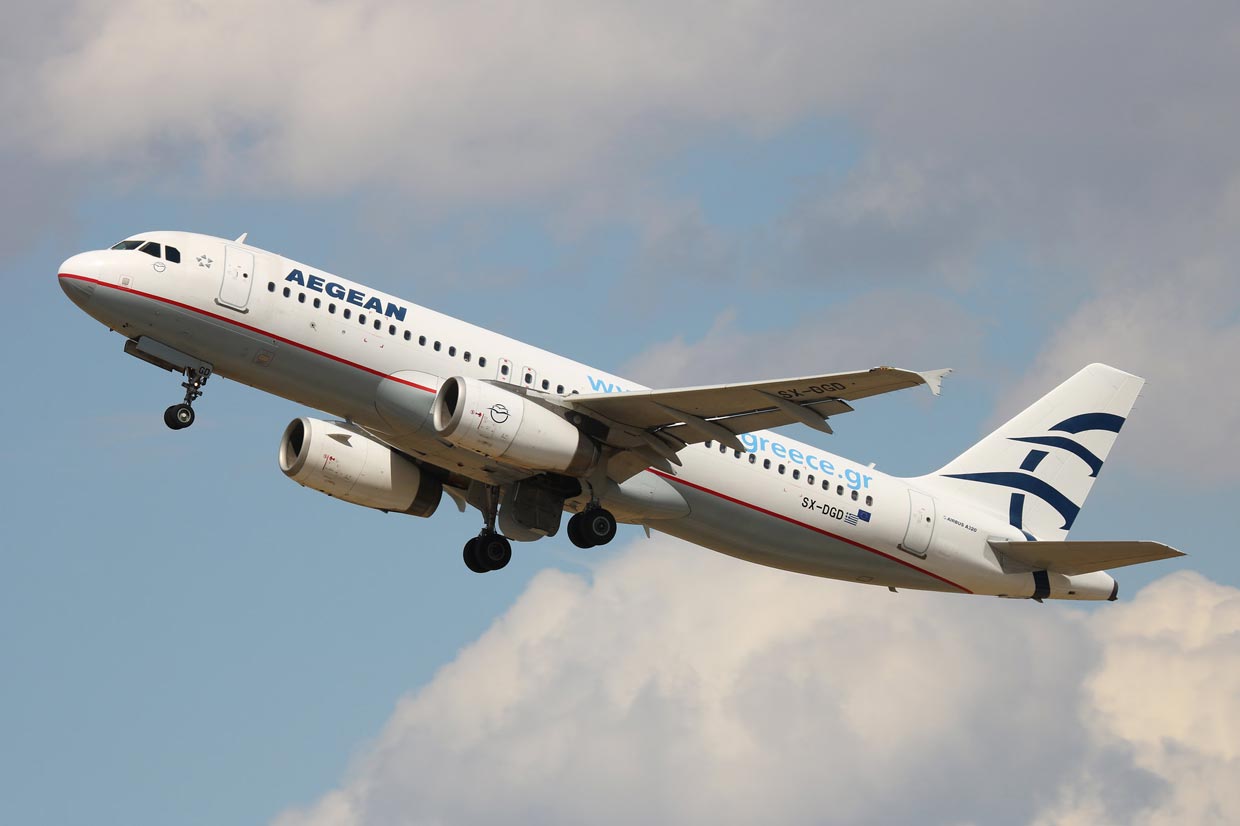
Routes & Network
Aegean Airlines boasts an extensive route network. As of 2025, it serves over 150 destinations across Europe, Asia, the Middle East, and Africa. Using Athens as a hub-and-spoke center, Aegean links Greek cities and islands to major European capitals and beyond. It operates year-round flights to key cities (London, Paris, Rome, Frankfurt, etc.) and seasonal routes to popular islands and vacation spots in the Mediterranean. The Star Alliance membership further extends its reach via code shares.
Aegean’s network strategy focuses on connecting Greece with both Western Europe and emerging markets in the Eastern Mediterranean and Middle East. Notably, it has a strong presence in connecting Athens to regional destinations in the Balkans and the Levant.
Fleet & Hubs
Aegean Airlines operates a modern all-Airbus fleet. As of March 2025, it has 67 aircraft in service, primarily from the A320 family (A320neo, A321neo, etc.). The fleet consists of A320 and A321 variants configured for short to medium-haul flights, with ongoing deliveries of new A321neo and A321XLR aircraft to support expansion.
The average fleet age is relatively young, and the airline continuously upgrades its planes for fuel efficiency and passenger comfort. The main operational bases are Athens (for international and domestic trunk routes) and Thessaloniki (for Northern Greece and Balkan routes), with additional focus cities on popular islands during the summer.
Service Classes & Onboard Offering
Aegean is a full-service carrier offering both Economy and Business Class on its flights. Economy passengers receive free meals or snacks (with a taste of Greek cuisine) and beverages, especially on international routes. Business Class offers lounge access, premium meals, extra baggage allowance, and more spacious seating.
While Aegean’s short-haul aircraft do not feature seat-back entertainment, the airline provides a streaming entertainment app and in-flight magazines. In-flight amenities include complimentary meals (even on many short flights) and Greek wine in Business Class. One downside is that Aegean does not yet offer in-flight Wi-Fi on its fleet yet.
The airline’s frequent-flyer program, Miles+Bonus, allows loyal travelers to earn and redeem miles and enjoy Star Alliance Gold benefits. Overall, Aegean’s onboard product is well-regarded for a regional airline, aligning with its 4-Star Skytrax rating.
Safety and Punctuality
Aegean Airlines has a strong safety record with no fatal accidents in its history. It adheres to EU safety standards and operates modern Airbus jets. The carrier is also known for its reliability- it has been ranked among the most punctual airlines in Europe, reflecting a high on-time performance.
During peak summer seasons, minor delays can occur, but Aegean generally maintains timely operations, contributing to positive customer experiences.
Customer Satisfaction
Customer reviews for Aegean are largely positive, citing friendly staff and a comfortable flying experience. Travelers often mention the added value of receiving free meals and the overall efficient service for a regional airline. Aegean routinely scores around 4/5 in customer ratings on travel platforms, and it has won multiple customer satisfaction awards in the region.
The combination of Greek hospitality, included amenities, and network convenience results in high loyalty among local and international travelers. Any negative feedback usually relates to extra fees (e.g., baggage fees for the lowest fares) or limited entertainment options, but these do not heavily detract from its strong reputation.
✔️ Positive Points of Aegean Airlines
On-time Performance: Aegean Airlines has a good reputation for punctuality and has consistently ranked among the most on-time airlines in Europe.
Comfort: The airline offers a comfortable flying experience with a modern fleet of aircraft and comfortable seating options.
Destination Network: Aegean Airlines operates a comprehensive route network, covering many destinations in Europe and the Mediterranean.
Customer Service: The airline has received positive reviews for its customer service, with friendly and helpful staff.
In-flight Amenities: Aegean Airlines offers a variety of in-flight amenities such as meals, drinks, and entertainment options to make flying more enjoyable.
Positive
- On-time Performance
- Comfort
- Destination Network
- Customer Service
- In-flight Amenities
Negative
- Limited Destinations
- Baggage Fees
- In-flight Comfort
- Limited Entertainment
❌ Negative Points
Limited Destinations: Although Aegean Airlines has a wide network, it may not cover all the destinations that you are interested in visiting.
Baggage Fees: The airline charges fees for checked baggage on the lowest fare types, which can be an additional cost for travelers.
No Wi-Fi: Aegean Airlines does not currently offer Wi-Fi connectivity on its fleet, which can be inconvenient for business travelers or those wanting to stay connected.
Limited In-flight Entertainment: The in-flight entertainment options on Aegean Airlines are limited compared to some other airlines, with no seat-back screens on short-haul aircraft.
Olympic Air

Olympic Air was originally the state-owned Olympic Airways, founded in 1957 by Aristotle Onassis. After privatization and rebranding, the current Olympic Air was established in 2009. In October 2013, Aegean Airlines acquired Olympic Air, bringing it under the same corporate umbrella. Today, Olympic Air functions as a regional subsidiary of Aegean, retaining its historic name and logo but coordinating network and ticketing with Aegean.
The airline’s headquarters is in Athens, and it shares Aegean’s main hub at Athens International Airport. The Olympic brand focuses on domestic routes, especially to Greece’s many islands and smaller airports, often operating as the feeder airline for Aegean’s international flights.
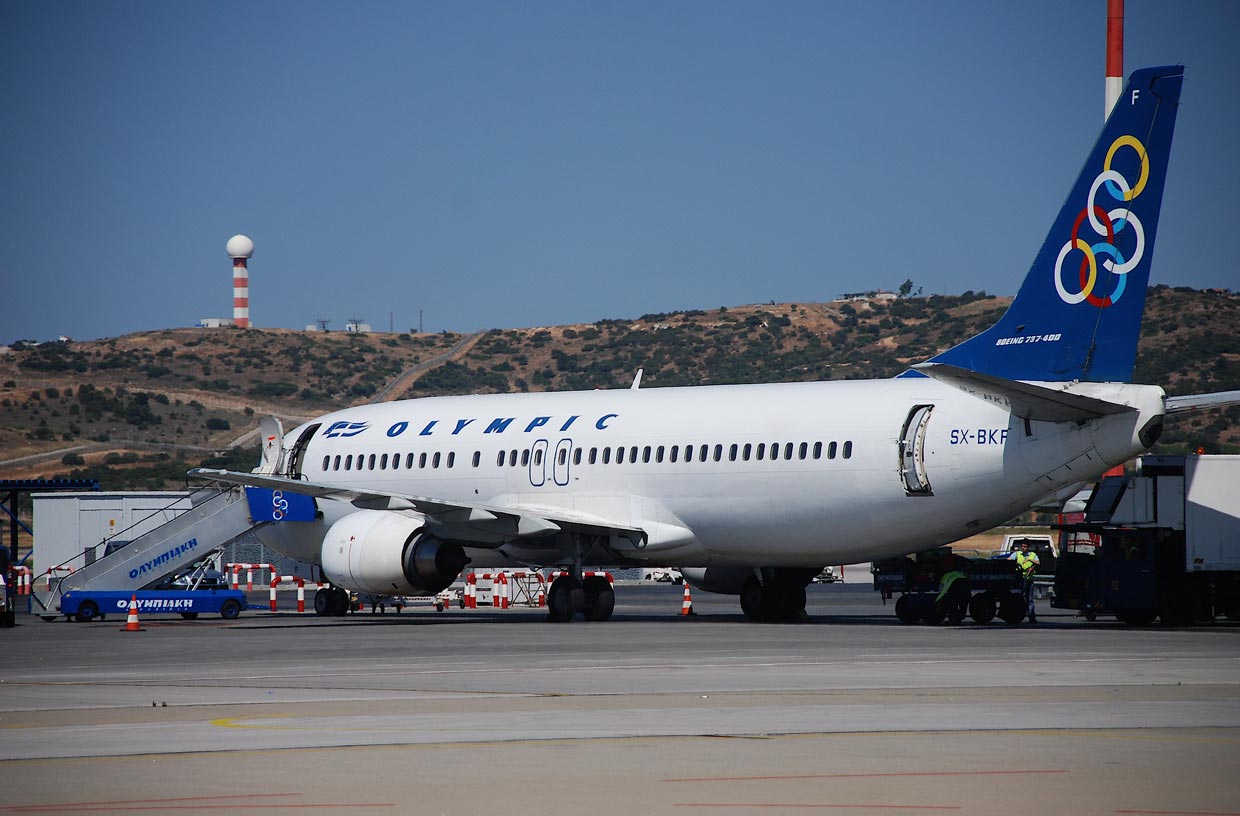
Routes & Operations
Olympic Air operates primarily domestic flights within Greece. Its mission is to connect Athens and Thessaloniki to regional cities and island destinations that may have lower demand or smaller airports. Olympic Air serves popular islands like Mykonos, Santorini, Crete, Rhodes, Corfu, and many others, as well as smaller islands such as Milos, Naxos, Paros, and Syros — some of which have only Olympic as a scheduled carrier.
The airline also links mainland cities (e.g. Ioannina, Kavala) to the hubs. Internationally, Olympic no longer operates its own flights — all international services carry Aegean’s flight code. Instead, Olympic’s flights are integrated into Aegean’s scheduling, and many routes are marketed under the Aegean code (A3). This arrangement allows seamless connections for passengers (one can book, for example, London–Athens on Aegean and Athens–Naxos on Olympic in one ticket).
Olympic Air’s mission is to ensure that even small communities in Greece have air access, often through public service obligation (PSO) routes subsidized by the government.
Fleet & Hubs
Unlike its parent, Aegean (all jets), Olympic Air operates a turboprop fleet suitable for short hops and small runways. As of late 2024, Olympic Air’s fleet includes 17 aircraft: specifically ATR 42-600s (3), ATR 72-600s (12), and a couple of de Havilland Canada DHC-8-100 (Dash 8) planes.
These turboprops are ideal for short island flights, offering operational efficiency and the ability to land on shorter airstrips. The ATR 72-600 (70-seat turboprop) is the workhorse on busier island routes, while the smaller ATR 42 and Dash 8 serve very short or low-demand routes (some islands have airports that can only handle the Dash 8).
Olympic Air’s flights are mainly out of Athens, with a secondary base at Rhodes for the Dodecanese islands. It also stations aircraft in other island airports seasonally to operate inter-island hops. The fleet is maintained to modern standards and painted in Olympic’s iconic livery featuring the five rings (symbolizing the Olympic rings).
Service & Classes
Olympic Air operates as an all-economy class airline on its short domestic sectors. The service is streamlined due to short flight times (often 30–60 minutes). Passengers typically receive a small snack or candy and water/juice on the flight.
Being integrated with Aegean, Olympic honors Aegean’s policies for baggage allowances and frequent flyer miles. Miles+Bonus members can earn and redeem miles on Olympic flights, and business-class tickets sold on Aegean (for a journey that includes an Olympic segment) will usually get free baggage and priority boarding on Olympic as well, even though the actual aircraft has only economy seating.
Check-in and customer service for Olympic are handled by Aegean’s systems, meaning passengers have a unified experience. While Olympic Air flights are short and have limited onboard amenities, they are appreciated for providing reliable connectivity. Notably, Olympic Air has maintained a good on-time record on its routes (essential given tight turnaround times and the need to connect with Aegean flights).
Safety and Reputation
Olympic Air has a strong safety record, with no major accidents in its current incarnation. (Its predecessor, Olympic Airways also had a solid safety history in later years, aside from a few incidents in the distant past.) The ATR and Dash 8 aircraft are operated with well-trained crews — many of Olympic’s pilots and engineers came from the original Olympic Airways, carrying decades of experience.
The Olympic brand is nostalgically significant in Greece; many locals still refer to their flight to the islands as an “Olympic” flight. Customer feedback is generally positive, citing the convenience of frequent island flights and the smooth integration with Aegean’s network. Some travelers note that aircraft are small and can be a bit noisy (typical for turboprops), but flights are so short that this is rarely a problem.
Overall, Olympic Air is seen as a reliable and efficient domestic carrier, critical for Greece’s tourism and inter-island connectivity.
Sky Express
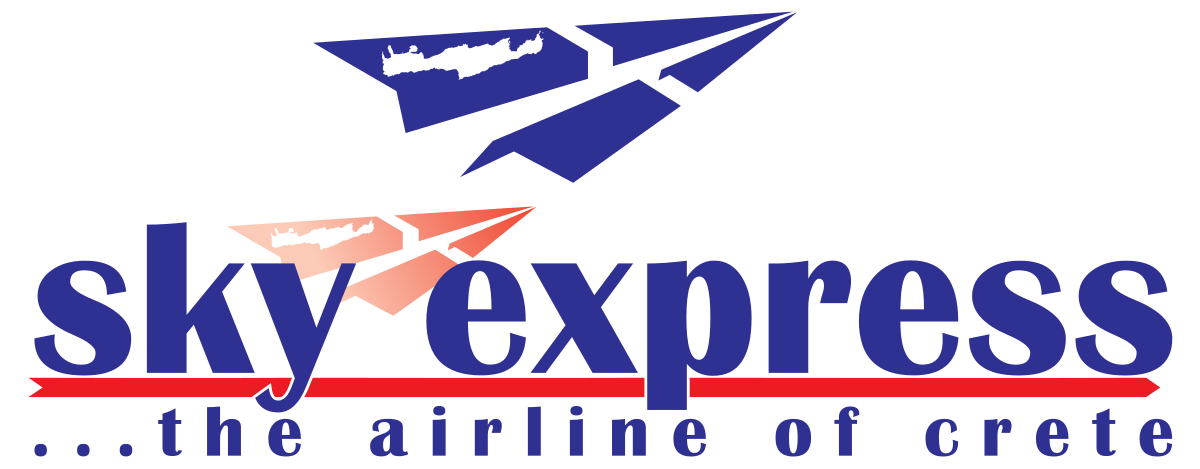
Sky Express (sometimes stylized as SKY express) is a private Greek airline headquartered in Heraklion, Crete. Founded in 2005, it started with small propeller aircraft serving island routes. In the last few years, Sky Express has undergone significant expansion, transforming into a hybrid low-cost carrier. It introduced jet aircraft in 2020 and grew its network beyond domestic flights.
Sky Express is now known for providing an economical option to fly within Greece, often filling the gap left by the former Olympic Airways on thinner routes. Its main hub shifted to Athens International Airport, especially after acquiring jets, while Heraklion remains an important base (particularly for its ATR turboprops).
The airline’s growth was accelerated after 2020 when it acquired several Airbus A320neo jets, positioning itself as a challenger to Aegean on some routes.
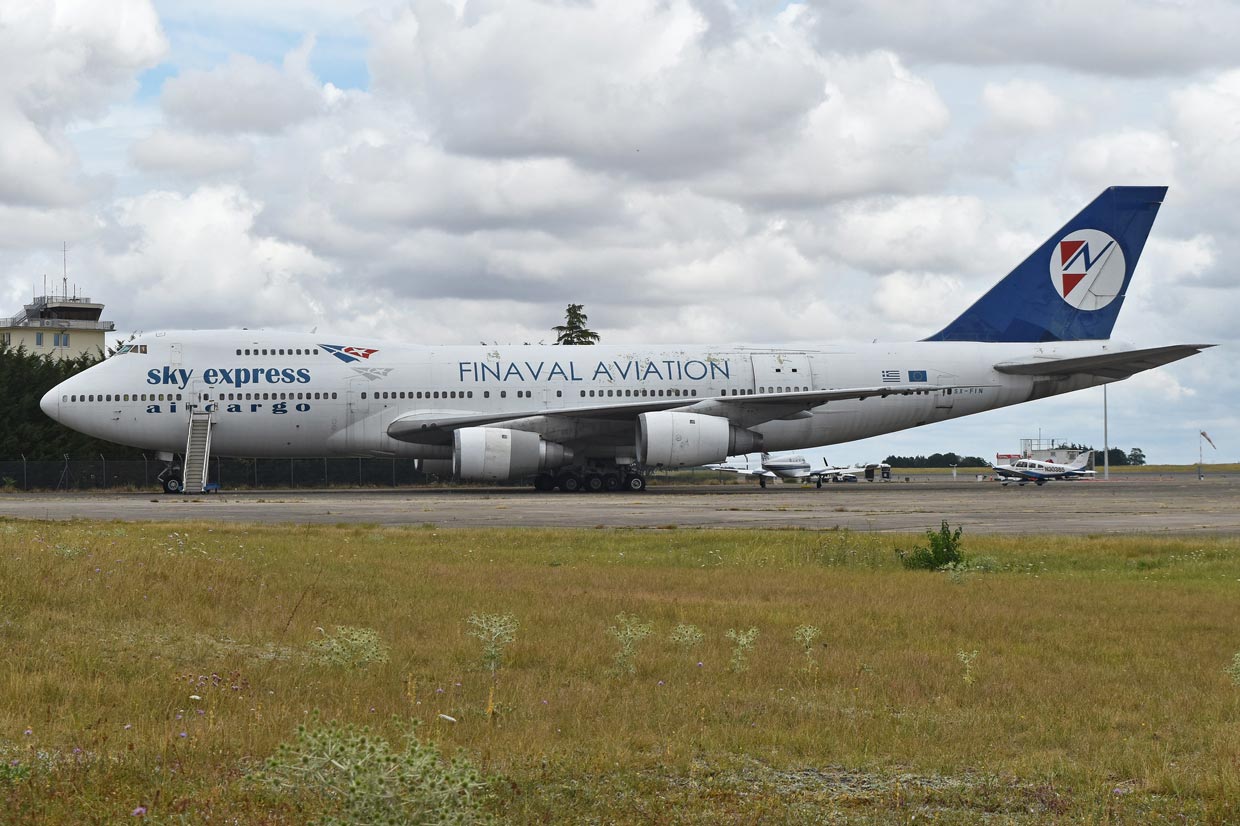
Fleet & Network Expansion
Sky Express currently operates a mixed fleet of turboprops and jets, totaling 27 aircraft as of 2024. This includes ATR 42-500/72-600 turboprops for short hops and Airbus A320neo/A321neo jets for busier domestic and new international routes. The fleet expansion (10 A-320 Neo and 2 A321neos in service) dramatically increased capacity and range.
Sky Express now serves over 50 destinations: specifically, 35 domestic airports in Greece and 18 international destinations in Europe. Domestically, it flies to virtually all major Greek islands (e.g. Crete, Rhodes, Corfu, Santorini, Mykonos) and many mainland cities. Internationally, since 2021 it has launched flights from Athens or Heraklion to cities like London, Paris, Rome, Brussels, Larnaca, Bucharest, and Berlin. Many of these are seasonal or a few times weekly, targeting leisure travelers.
The expansion made Sky Express the second-largest Greek carrier by fleet and network behind Aegean. The airline often partners with bigger carriers via interline agreements; for instance, it has partnerships allowing through-ticketing with Air France, KLM, Qatar Airways, etc., which feed passengers into Sky Express flights to the islands.
Service Model & Pricing
Sky Express operates on a low-cost carrier (LCC) model for the most part. Its fares are generally lower than Aegean’s, especially if booked in advance, making it attractive for budget-conscious travelers. However, the lower base fare means that extras like checked baggage, seat selection, and onboard meals often come at an additional cost (depending on the fare bundle purchased).
Onboard, Sky Express offers a single Economy class on all aircraft. Passengers can buy snacks or drinks on board (complimentary service may be minimal on the shortest flights). The newer Airbus jets feature modern seating and a fresh green/pink livery that has improved the brand image.
Despite being low-cost, Sky Express has kept some service elements — for example, it provides a free small checked baggage allowance on certain fares and often a complimentary water or candy, keeping a touch of Greek hospitality. The airline introduced a frequent flyer program called “SkyExpress Bonus” recently, but it’s not as extensive as Aegean’s.
Pricing is a strong suit — many Greeks use Sky Express as a cheaper alternative, and on routes where it directly competes with Aegean (like Athens–Santorini or Athens–Heraklion), its presence has helped keep fares competitive.
Punctuality & Performance
Sky Express has had a good safety record with no serious accidents to date. Being a younger/smaller airline for much of its history, it flew under the radar but maintained EU safety standards. With rapid growth, there were some growing pains — e.g., in peak summer 2022 some flights faced delays due to fleet utilization and handling adjustments. However, by 2023, the airline reported improved on-time performance and reliability.
Its turboprop operations occasionally face weather-related delays (small island airports can be tricky in high winds), but overall, Sky Express’ punctuality is acceptable, though not yet on par with Aegean’s stellar record. The safety record is clean, and the airline is IOSA certified (IATA Operational Safety Audit), underscoring its commitment to international safety practices. Maintenance of the new Airbus fleet is often contracted to Airbus or certified maintenance organizations in Europe.
Customer Reviews & Reputation
Passengers appreciate Sky Express for its affordability and new planes on the jet routes. The cabin experience on the A320neo is often praised — leather seats and mood lighting — giving a feel of a larger airline. However, customer reviews are mixed to positive.
Many domestic travelers are happy to have more flight options and mention that crews are friendly. On the other hand, some reviews cite confusion over baggage policies or fees (e.g., the lowest fare includes only a small carry-on, which caught some travelers by surprise). In-flight service is more limited, which some understand due to the price, but others (expecting Aegean-like service) have given feedback accordingly.
Overall, Sky Express is building its reputation and generally scores around 3.5/5 in customer ratings. It is increasingly seen as a reliable second choice after Aegean for Greek air travel, and its entrance into major routes has been welcomed by many travelers for the added convenience and capacity.
Bluebird Airways
Bluebird Airways is a Greek airline headquartered in Heraklion (Crete), established in 2008. It began operations focusing on charter flights and scheduled services from Greek islands to destinations in the Eastern Mediterranean. Bluebird’s primary market has been flights between Greece and Israel.
The airline gained recognition for offering direct connections from Heraklion (and occasionally other Greek cities) to Tel Aviv, catering to tourists and business travelers between Greece and Israel. Over time, Bluebird Airways expanded to serve some routes into Central Europe / Eastern Europe on a seasonal basis as well.
It remains a relatively small carrier, positioning itself as a supplementary service provider alongside bigger airlines. The main operating base is Heraklion International Airport (HER), with seasonal operations from other airports like Rhodes or Athens, depending on demand.
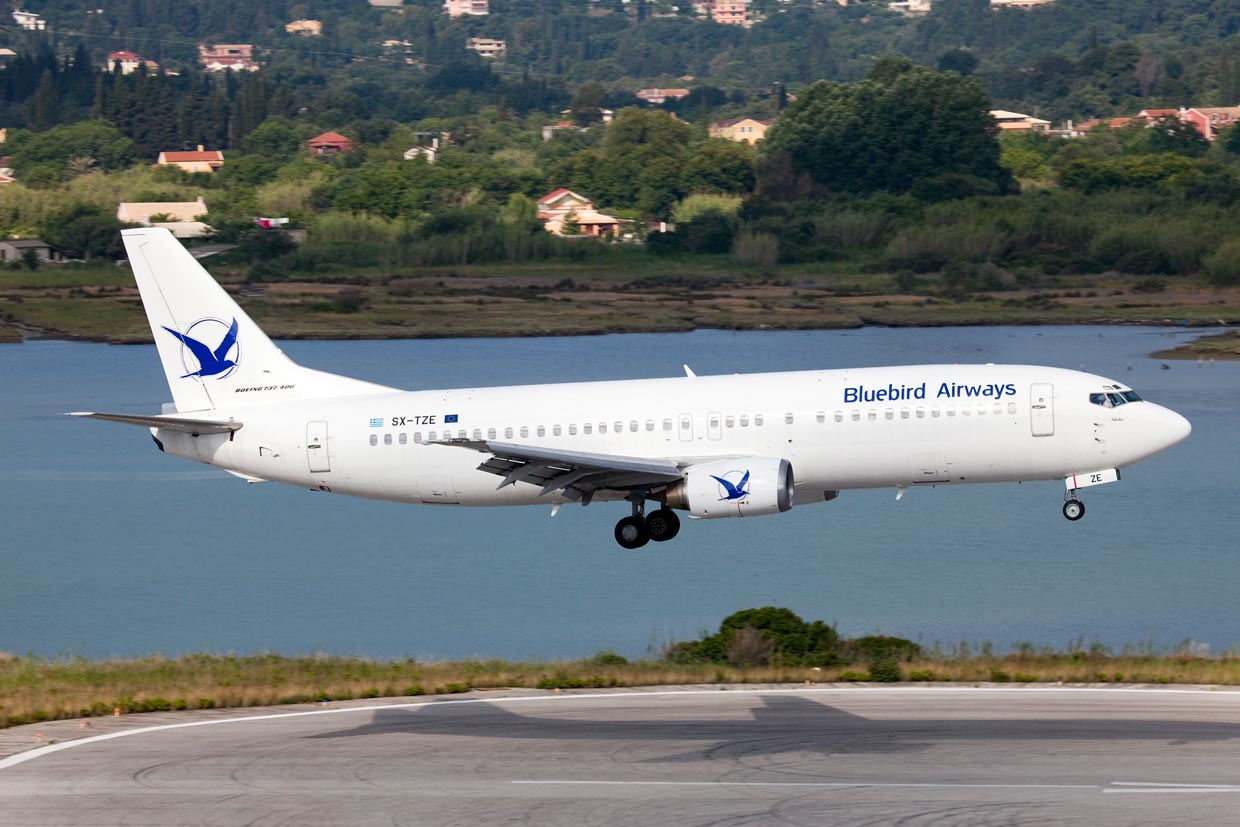
Fleet & Destinations
Bluebird Airways operates a small fleet of 4 aircraft, currently all Boeing 737-800 models. (In earlier years, it flew Boeing 737-300/400s, but those have been phased out in favor of the slightly newer 737-800 with 189 seats.)
With this fleet, Bluebird serves about 10–12 destinations. Its core year-round route is Heraklion to Tel Aviv. Additionally, Bluebird has operated flights from Greek tourist spots (Heraklion, Rhodes, Corfu) to cities like Tel Aviv, Larnaca (Cyprus), and occasionally charter services to Italy, France, or Poland in the summer.
During the peak season, the airline often flies holidaymakers from Israel to Greek island resorts (hence Tel Aviv–Heraklion being very popular) and vice versa, Greeks to Israel for pilgrimage or business. In the off-season, operations scale down significantly.
The airline’s network can change year to year based on charter contracts — for example, one year, Bluebird might run a series of flights from Kos or Zakynthos to Tel Aviv if there is demand. Overall, the route network is limited and very targeted: Bluebird is not a domestic carrier, and all its flights are international medium-haul (3–4 hour) segments.
Service & Operations
Bluebird Airways functions somewhere between a charter and a scheduled airline. Many of its flights are sold by tour operators (especially in Israel) as part of vacation packages to Greece. It also sells tickets directly, usually via travel agencies or its website, for point-to-point travel.
Onboard service is relatively basic — the airline offers economy class seating with buy-on-board refreshments. Given the holiday nature of its flights, sometimes a complimentary drink or snack is provided, but it is not a full-service carrier.
Bluebird does emphasize that it adheres to “strict European standards” in operations. This marketing point is likely to assure customers of safety and quality, considering some of its clientele may compare it to Israeli carriers. The staff are often bilingual (Greek and Hebrew/English) to serve the mix of passengers.
The airline doesn’t have a frequent flyer program or multiple classes; it keeps things simple. Planes are configured densely, which keeps the cost per seat low — contributing to moderately priced tickets (though not always “low-cost” due to smaller scale).
Safety & Reputation
Bluebird Airways has maintained a clean safety record since its inception. As a Greek/EU airline, it meets all EASA safety regulations. The Boeing 737-800s it operates are standard, widely-used aircraft and are maintained according to EU standards.
The airline’s relatively small size means it’s not highly ranked in global on-time or performance statistics, but it has a fair record of punctuality. Delays can happen (especially when aircraft are stretched across several routes), but Bluebird’s simpler network has, in recent years, run without major issues.
Customer feedback for Bluebird Airways is somewhat limited given its niche market. Tour operators generally rate the service as satisfactory for charter needs. Passengers often note that the aircraft, while older, are comfortable enough for short hops. Some Israeli travelers appreciate having a Greek alternative to the Israeli airlines on the Tel Aviv routes. Complaints, when they arise, typically involve schedule changes or baggage fees.
On the whole, Bluebird Airways fills a small but useful niche in Greek aviation, providing direct connectivity that larger airlines might not find viable. Its commitment to specific markets (primarily Israel–Greece) has made it a known name in that segment.
Lumiwings
Company Background
Lumiwings is a Greek airline founded in 2015 by a team including former pilots of the defunct Astra Airlines. The airline is headquartered in Markopoulo, Athens (near Athens Airport). Initially, Lumiwings started operations in 2018 by providing capacity to other airlines — for example, it flew a Boeing 737 on behalf of Astra Airlines on a short lease.
After Astra’s failure, Lumiwings carved out its own operations. Interestingly, Lumiwings bases much of its activity outside Greece: it has been operating from Italy in recent years. The airline positions itself as an adaptable carrier offering both charter services and scheduled flights on niche routes.
With a very small size, Lumiwings has kept a low profile, but it is an officially registered Greek carrier (with Greek AOC) and, thus, part of the Greek aviation landscape.
Fleet & Operations
Lumiwings has a tiny fleet of 2 aircraft — as of 2024, these are typically Boeing 737 classic series (one 737-300 and one 737-700, for example). The fleet may change (they have leased different individual aircraft over time) but it remains around two planes.
With such a limited fleet, Lumiwings can only operate a handful of routes at a time. The airline’s strategy has been to serve routes that bigger airlines have left underserved, often in the Italian market. For instance, in 2021–2022, Lumiwings based a plane at Forlì Airport in Italy (a secondary airport) and launched flights from Forlì to destinations like Palermo, Trapani, Cefalonia, Zakynthos, Arad (Romania), and others. Some of those flights connected Italy to Greek islands (Cefalonia, Zakynthos) in the summer.
It also operated routes from Forlì to Eastern Europe (Romania) to tap migrant worker travel. In Greece, Lumiwings has operated charters — e.g., flying groups from Poland or Ukraine to Greek tourist destinations.
Essentially, Lumiwings’ network is variable: it conducts seasonal charters and a few scheduled routes which can change each season. In 2024, reports indicated Lumiwings focusing on routes from Forlì and also some plans to connect Kaunas (Lithuania) with Greece, etc. Because of this dynamic model, the airline’s destinations (about 4 scheduled at any time) are not fixed year-round. It’s very much a supplemental carrier.
Service Model
Lumiwings operates with a charter/low-cost hybrid model. On scheduled flights, it sells affordable tickets, generally targeting leisure travelers. There is only Economy class seating on its 737s. Services are minimalistic — likely buy-on-board snacks, with the possibility of some included refreshment on charters depending on what the chartering client requests.
Being so small, Lumiwings does not have a frequent flyer program or elaborate extras. It often works directly with tour operators or local authorities (for example, Forlì Airport’s management contracted Lumiwings to open routes to boost the airport).
Pricing on Lumiwings routes tends to be low to stimulate demand (for example, one-way fares in Italy were often as low as €50–€70 to Sicily). The flipside is that schedules can be irregular (2–3 times weekly on a route, or only seasonal).
Reputation & Recent Developments
Lumiwings is still establishing its reputation. As a minor player, it’s not widely reviewed on international platforms. However, niche travel forums in Italy and Greece have noted that Lumiwings provides clean, on-time flights and “does the job” for the routes it serves. Passengers should set expectations accordingly — it’s a small outfit, so things like last-minute schedule adjustments or older aircraft are possible.
The airline’s safety record is clear; it has had no incidents under its operation. The pilots and crew often have backgrounds in other Greek airlines, bringing experience. One notable aspect: since it’s Greek-registered, Lumiwings falls under Greek and EU aviation authority oversight, which is a positive sign for safety and reliability standards.
As of 2025, Lumiwings appears to be continuing its model of contracting out its capacity. It remains to be seen if the airline will grow its fleet or possibly cooperate with larger Greek carriers. For now, it’s a boutique Greek airline with a focus on ad-hoc operations, illustrating the diversity of the Greek aviation sector beyond the big names.
Air Mediterranean
Air Mediterranean is a Greek airline founded in 2017 with an initial ambitious plan to link Athens with destinations in the Middle East and Africa. It obtained its air operator’s certificate in January 2017 and positioned itself as a carrier to “cover gaps between countries with poor connectivity”, using Athens as a hub.
In late 2017, Air Mediterranean launched scheduled flights out of Athens to cities like London (UK), Stockholm (Sweden), Jeddah (Saudi Arabia), Khartoum (Sudan), and Casablanca (Morocco). The concept was to connect Europe with emerging markets in Africa/Middle East via Athens. The airline’s hub was Athens Airport, with a secondary base planned in Khartoum at one point.
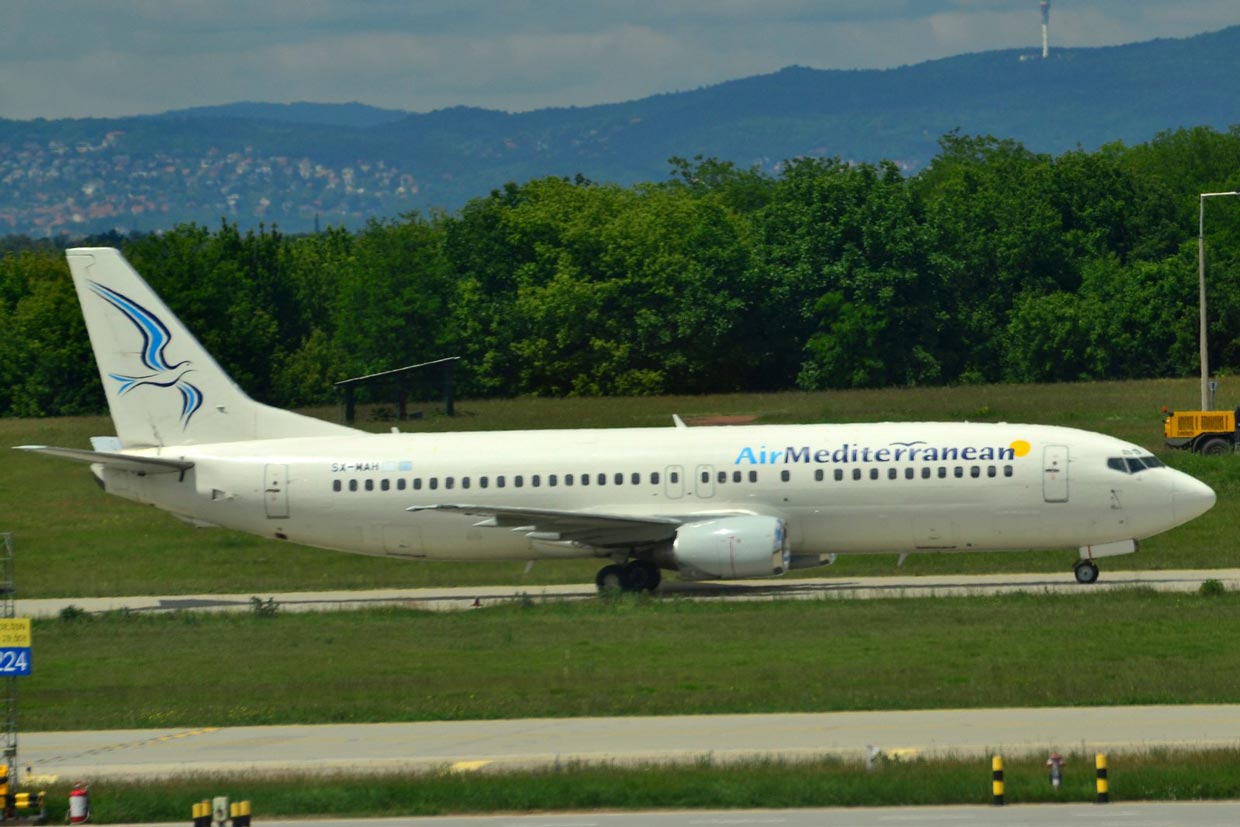
Early Suspension and Shift to Charters
Despite the grand plans, Air Mediterranean’s scheduled operations were short-lived. The airline commenced passenger flights on 1 November 2017, but by mid-January 2018 — just a few months later — it suspended all scheduled flights due to financial and operational difficulties. In February 2018, the company announced it would cease scheduled operations and focus exclusively on charter flights going forward.
This abrupt halt meant routes like Athens–London lasted only weeks. Since then, Air Mediterranean has pivoted to become primarily a charter and ACMI (aircraft leasing) airline. It markets its ability to operate flights on behalf of other companies or run ad-hoc charters. For example, Air Mediterranean aircraft have been leased to carriers in need of extra capacity, and the airline has operated charter flights carrying pilgrims, holidaymakers, or relief missions.
Fleet & Current Operations
Air Mediterranean started with a fleet of 2–3 Boeing 737-400 aircraft (classic 737s with about 168 economy seats). As of 2023, it still has 3 Boeing 737-400s in its fleet. These mid-aged planes are versatile for short to medium hauls.
The airline’s operational pattern now depends on contracts — for instance, during summer, it might operate charter flights from destinations in Europe to Mediterranean resorts. It has been reported to run flights for tour operators from France and Spain to Greece or Egypt.
In 2020–2021, Air Mediterranean also found a niche by basing aircraft in Forlì, Italy, operating some scheduled flights from there (Forlì is the same airport Lumiwings used — Air Mediterranean operated Forlì to destinations like Athens and a couple of cities in Greece).
In addition, the airline has engaged in wet-lease operations (providing plane+crew) to other airlines in Africa. For example, at times, an Air Mediterranean 737 was painted in another airline’s livery and flown in Central or West Africa under contract.
Service & Market Position
When Air Mediterranean ran scheduled flights, it styled itself as a full-service carrier with affordable prices — luggage and meals were included, reflecting more of a traditional approach. The target was ethnic travelers and traders moving between Europe and Africa/Middle East.
However, since moving to charters, the service model is dictated by the client. If it’s a Hadj pilgrimage charter, service might be minimal but focused on specific needs; if it’s a summer holiday charter, there might be a simple snack service. The airline does not have its own ticket sales now (for the most part, the general public cannot directly book Air Mediterranean flights unless part of a charter). This makes it largely invisible to regular travelers.
Safety and Reviews
Air Mediterranean is a very small operation and aside from some early complaints about cancellations when the scheduled flights stopped, there’s not a lot of public feedback. It has had no accidents in its short operational history.
One notable aspect is that the airline’s abrupt suspension in 2018 left some passengers stranded or needing refunds, which did hurt its reputation at the time. Since refocusing on charters, it has quietly performed its contracts without garnering public reviews.
In industry circles, Air Mediterranean is seen as one of several small Greek carriers that provide charter capacity — a successor in some ways to companies like Astra or Orange2Fly (now defunct) in that market. It holds a European AOC, which is a plus for contracting parties looking for stringent safety oversight.
In summary, Air Mediterranean’s grand vision didn’t take off as planned, but it continues to fly as a charter specialist, making it a unique if lesser-known part of Greece’s airline list.
Amjet Executive
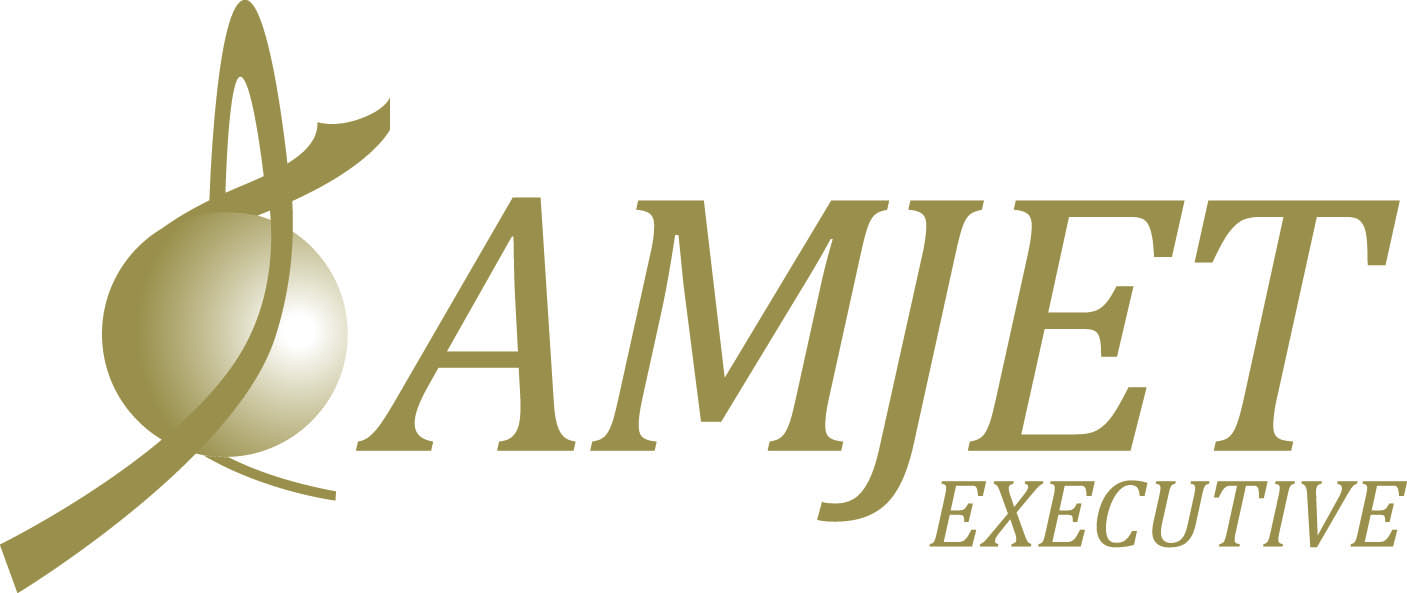
Amjet Executive is a Greek business aviation and private charter airline founded in 2009. Established by Capt. Abakar Manany (an airline pilot turned entrepreneur) in late 2009, Amjet commenced operations in early 2010 after receiving its Air Operator Certificate with a Gulfstream business jet. The company is headquartered in Athens and positions itself as a premium provider of private jet services.
Unlike commercial scheduled airlines, Amjet’s focus is on on-demand charters, serving high-net-worth individuals, corporations, and government officials who require private flights. Amjet Executive has grown to become one of the leading private jet operators in Greece and the region, often handling VIP flights for important clients (for example, heads of state visiting Greece might charter Amjet, or wealthy tourists from the Middle East use its services).
The company also opened an office in Geneva in 2011 to serve the business jet market in Europe.
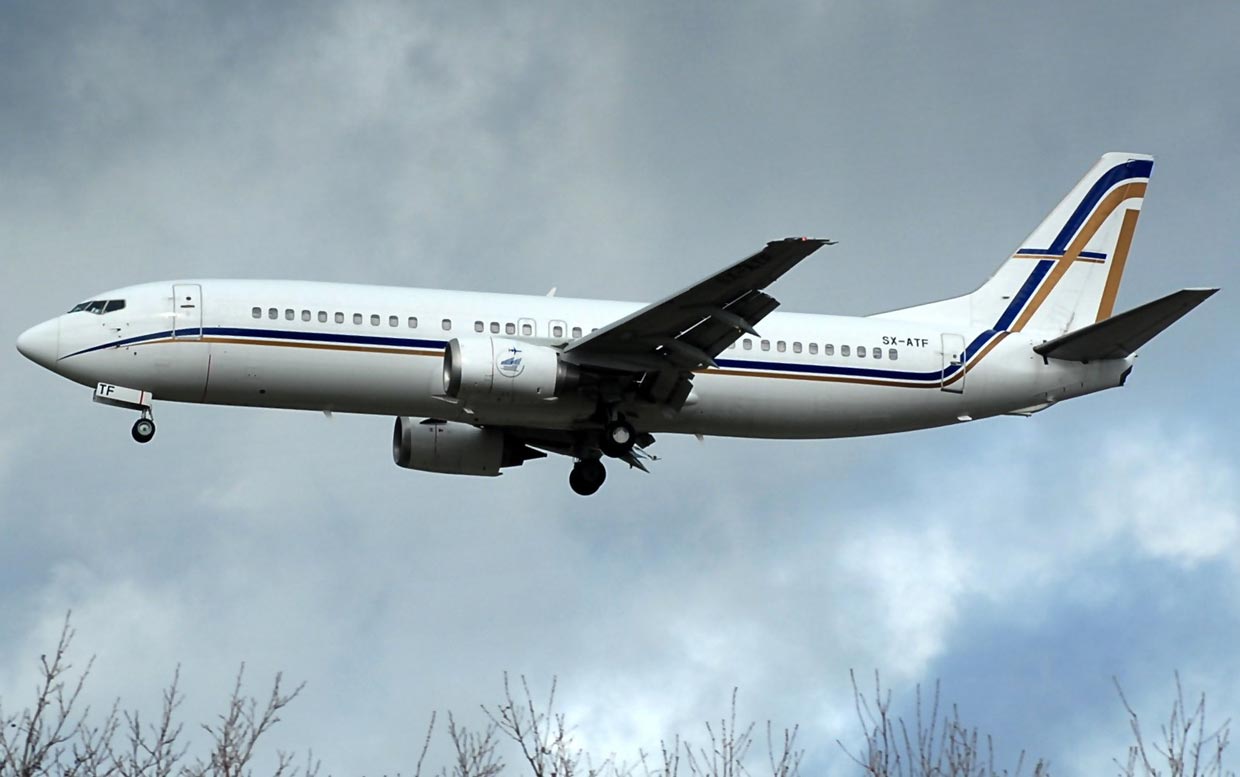
Fleet & Services
Amjet Executive boasts a diverse fleet of business jets to accommodate different client needs. Its fleet ranges from small corporate jets to large VIP airliners. Notably, Amjet’s fleet (as listed in 2019) included Dassault Falcon 50/7X/8X/900 models, Bombardier business jets, and even a VIP-configured Airbus A319 Corporate Jet (A319CJ).
Impressively, Amjet also has a McDonnell Douglas MD-83 in executive configuration (with just 42 VIP seats). This variety means Amjet can handle everything from short hops with a handful of passengers (e.g., a Falcon 50 for 8 passengers) to larger group charters (e.g., an MD-83 for a sports team or delegation).
All aircraft are configured luxuriously — think plush leather seats, sofas, conference tables, and even bedrooms on some of the long-range jets. Services offered by Amjet include private jet charter flights worldwide, aircraft management (managing jets on behalf of owners), and brokerage for clients looking for specific aircraft. Amjet can arrange helicopter transfers, bespoke in-flight catering, concierge services on the ground, etc. It’s essentially a one-stop shop for VIP travel needs.
Market & Operations
Amjet Executive operates on an as-needed basis, not with scheduled routes. Common missions for Amjet might be: a wealthy family wants to vacation in the Greek islands — Amjet will fly them from Paris to Mykonos directly; or a multinational company needs to send executives to multiple Balkan cities in one day — Amjet provides the jet and itinerary.
The main operating base is Athens, but Amjet’s jets can depart from wherever the client needs (it can position an aircraft to any airport). The company often highlights the convenience of reaching Greek islands or remote destinations that lack commercial flights, using private aircraft.
They have also offered head-of-state flights — for instance, if the Greek government’s plane is unavailable, they might charter an Amjet aircraft for official travel. Amjet’s presence in Geneva signifies its reach into the broader European market for ultra-rich clientele.
Reputation
Within the business aviation circle, Amjet Executive is well-regarded. It holds Argus and Wyvern safety ratings and is a member of the European Business Aviation Association (EBAA), reflecting its commitment to high operational standards. Safety and confidentiality are paramount in this sector, and Amjet has a spotless safety record.
Clients often remain anonymous, but the fact that the company’s fleet continues to grow (adding new Falcons, etc.) indicates strong demand. For travelers used to commercial flying, Amjet’s world is very different: there are no lines, you depart from private terminals, and every flight is custom-tailored. The cost is accordingly very high — but for its target customers, service quality is top-notch.
Reviews from those who have used Amjet (occasionally, travel bloggers or luxury lifestyle magazines get a glimpse) mention the absolute comfort and professionalism: experienced pilots (often ex-airline captains), cabin attendants who can speak multiple languages and attend to any request, and aircraft cabins that feel like flying living rooms.
Amjet was even featured in some media for providing one of the best VIP flight experiences in the region, with attention to detail from catering (gourmet meals, fine wines) to ground transportation (limousine straight to the plane). While not a household name to the flying public, Amjet Executive represents Greece in the ultra-luxury aviation market, and its inclusion here shows the breadth of “Greek airlines” — from big commercial carriers to bespoke charter firms. In its category, Amjet is considered a 5-star operation, flying clients globally with discretion and elegance.
GainJet Aviation
GainJet Aviation is another major player in Greece’s private aviation sector. Founded in 2006, GainJet is headquartered in Glyfada, Athens — a district where several aviation companies are based. GainJet operates worldwide charter services and specializes in executive aircraft management. Essentially, it provides private jets for hire and also manages jets for owners (crew, maintenance, operations) under its AOC.
GainJet has expanded beyond Greece, establishing offices or subsidiaries in places like Ireland and the Middle East to attract a global clientele. The company’s name became known to the public in various contexts — for example, sports teams and celebrities have chartered its planes, and it occasionally appears in the news (such as providing the plane for a famous football team’s tour, etc.).
GainJet’s motto is offering bespoke travel with flexibility, much like Amjet, but GainJet is perhaps even more prominent in terms of fleet size and high-profile missions.
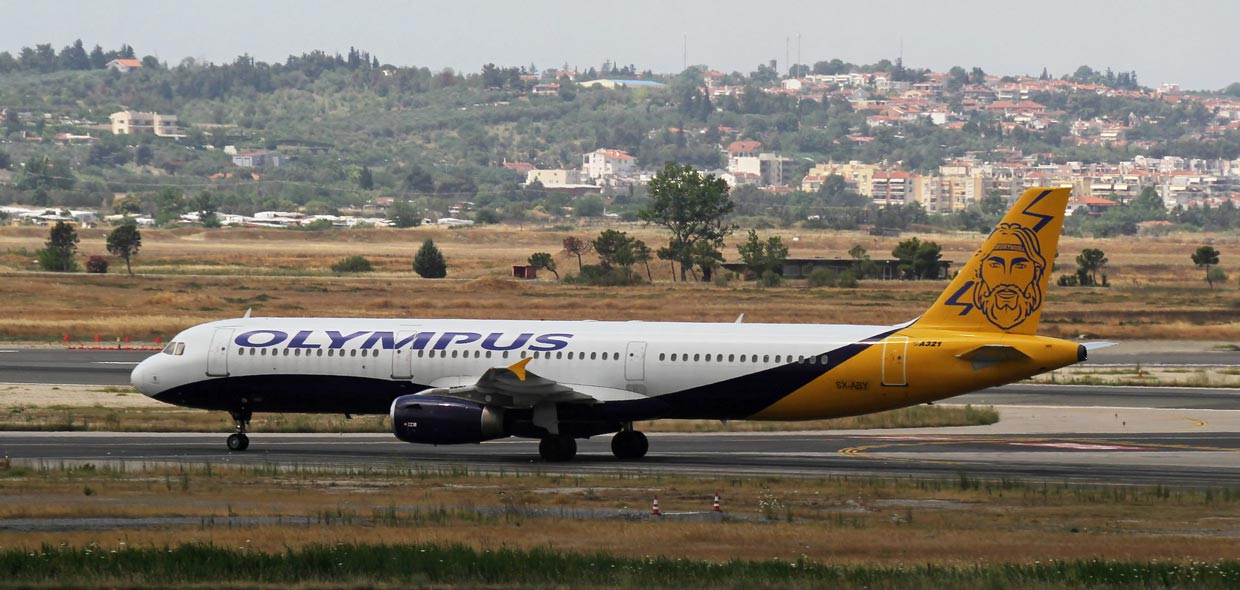
Fleet & Capabilities
GainJet Aviation operates a fleet of around 10+ private jets, and it is particularly noted for having some large VIP-configured airliners. For instance, GainJet owns a Boeing 757-200 “VIP Wing” which has been used to transport sports teams (the Irish national football team flew on it, as did the U.S. women’s national soccer team for a victory tour). This 757 has a luxury layout suitable for about 50–70 passengers in great comfort.
GainJet also has a Boeing 737-400 VIP (with an executive interior) and an MD-87 VIP. In the pure business jet category, GainJet’s fleet includes Gulfstream G650, G550, G450 long-range jets, a Bombardier Global Express XRS, Challenger 604/605, and an Embraer Legacy 600, among others.
This diverse fleet allows GainJet to cover everything from intercontinental flights (the Gulfstream G650 can fly nonstop from Athens to New York) to short hops. The charter fleet is positioned across Europe and the Middle East to serve clients conveniently. For example, one of its Gulfstreams might be based in London for a period, while another plane is in Dubai for the private travel season there.
GainJet’s aircraft are often painted in a discreet white and gold livery with the company logo; however, the 757 carries a more distinct livery and has been spotted at many airports during charters.
Services & Niche
GainJet provides similar services to Amjet — private charter flights, aircraft management, medical evacuation flights, etc. An additional niche for GainJet is government and diplomatic flights. The company has in the past been contracted to fly presidents and prime ministers of certain countries.
One famous incident: in 2020, GainJet was reported to have been involved in the transport of a Rwandan political figure, leading to some controversy — highlighting that it sometimes undertakes sensitive missions at the behest of governments. This underscores GainJet’s role in special missions. They have also supported music world tours (flying bands and equipment).
The operations center in Athens coordinates flights globally, handling permits, security, and luxury concierge for passengers. Pricing is not public, but charters can easily cost tens of thousands of euros per flight.
Reputation & Safety
GainJet is known in the industry for its professionalism and large capacity. It’s one of the few operators that can provide a VIP airliner like a 757 — which sets it apart. The safety record is excellent; being an EU-registered carrier, it meets all regulatory requirements. GainJet’s crews are highly experienced — often former military or airline pilots at the helm of its big jets. The company, like Amjet, is ARGUS Platinum-rated and has all the necessary safety audits.
In terms of customer experience, GainJet strives for “VIP in every detail.” This means customized catering (clients can request any cuisine), in-flight entertainment tailored to the group (even live broadcasts or meetings on board via Wi-Fi), and any configuration in the cabin as needed (some jets can have beds made up for overnight flights).
For example, when sports teams charter the 757, GainJet can configure seating so that athletes have extra space to stretch and there are meeting areas for coaches. The feedback from such charters is usually very positive — teams have mentioned the comfort and convenience of flying with GainJet on tight schedules (no airport queues, direct routes).
In summary, GainJet Aviation is a flag-bearer of Greek business aviation, illustrating that Greece doesn’t only have holiday charters but also high-end jet operators. Its inclusion among top Greek “airlines” is because of its size and prominence: though not an airline in the commercial sense, its fleet size and global operations rank it as one of Greece’s largest aviation companies. It provides a very different product — private flying at its finest — complementing the commercial airlines in serving Greece’s and the world’s travel needs.
Air Power (Hoper Helicopter Services)
Air Power is the newest name to enter the list of Greek airlines, having commenced operations in 2024. While information is still limited due to its recent launch, Air Power is understood to be the company behind “Hoper”, a helicopter shuttle service in Greece. Essentially, Air Power obtained an airline license and has introduced daily helicopter flights connecting Greek islands and coastal cities — a novel concept aimed at improving connectivity where airports are absent or ferry rides are long.
The venture gained attention in mid-2024 as it promised quick island-hopping by helicopter, branded as “Hoper”. The main operating base for these flights is likely Athens or other key hubs like Mykonos, with routes planned to islands that lack airports (for example, connections from Athens to popular yacht destinations or between islands directly).
Services & Operations
Under the Hoper service, Air Power uses modern helicopters (such as twin-engine Airbus Helicopters models) to run scheduled hops. These helicopters can seat around 6–15 passengers depending on the model. The idea is to offer tickets on a per-seat basis, unlike typical helicopter charters which require renting the whole aircraft. For instance, a traveler could book a single seat on a helicopter from Mykonos to Santorini, making the journey in a fraction of the time it would take by ferry.
The schedule is often daily or a few times a week for each route, focusing on tourist demand. Air Power’s network is not extensive in terms of airports — instead, it utilizes heliports or designated landing sites. Destinations likely include popular islands without airports (like Hydra, perhaps) or direct heli-links like Santorini–Mykonos, Athens–Mykonos, etc. Because it’s in the early stages, the exact routes are subject to adjustment based on demand.
The marketing emphasizes that the helicopter flights drastically cut travel times and provide spectacular aerial views, turning transit into an experience.
Fleet
The Air Power/Hoper fleet consists of a few helicopters configured for passenger shuttles. While exact numbers aren’t published, it may have started with 2–3 helicopters. These could be types like the Airbus H145 or Bell 429, which are commonly used for air shuttle services due to their safety and capacity.
The helicopters are likely air-conditioned, with comfortable seating and large windows. Given the venture’s focus on tourism, safety and comfort are top priorities — the choppers are equipped with modern avionics and operated by experienced pilots.
Pricing & Convenience
Flying by helicopter is expensive, and Air Power’s business model banks on affluent tourists willing to pay a premium for convenience. A seat on a Hoper flight can cost several hundred euros (depending on route length), but it turns an hours-long ferry ride into a 20-minute flight. For luxury travelers with limited vacation time or those who simply want the experience, this is attractive.
Air Power also offers on-demand charters through Hoper for those who want a private helicopter. By being a licensed “airline”, it can also sell these flights through travel agencies and partner with resorts. There are indications that certain high-end resorts in Greece partner with Hoper to offer their guests seamless transfers.
Challenges & Prospects
As a brand-new operator, Air Power (Hoper) faces the challenge of establishing reliability and safety trust. Helicopter operations are weather-sensitive; high winds or poor visibility can cancel flights, so managing customer expectations is key. The company has been working with the Hellenic Civil Aviation Authority to ensure all safety protocols.
It’s noteworthy that Air Power received its operating certificate in 2024 with HCAA approval, which underscores that it meets regulatory standards. The concept of scheduled helicopter airlines is relatively new in Greece (though seaplanes were attempted in the past), so Air Power is something of a pioneer. If successful, it could pave the way for more point-to-point air services within Greece that bypass the need for runways.
Current Status
As of 2025, Air Power’s Hoper flights are operational on select routes, primarily during the summer tourist season. The feedback from initial customers has been positive regarding the time savings and unique experience. Some travelers described it as “like an aerial taxi” that turned what would be a full-day island transfer into a short scenic hop.
The volume is of course, niche — this doesn’t compete with large airlines but adds a layer to Greece’s transport network. We include Air Power in the top 10 list as it represents innovation in Greek aviation and fills a specialized connectivity need. Its fleet and network are small, but its focus on scheduled intra-Greece helicopter service makes it stand out as an airline venture.
(Since Air Power/Hoper is very new, prospective customers should check the latest schedules and availability. The airline’s development will be one to watch in the coming years as it potentially expands to more islands.)
Marathon Airlines
Marathon Airlines (also known as Marathon Aviation) is a Greek airline headquartered in Glyfada, Athens, that commenced operations in 2019. It is not a typical commercial airline but rather a provider of charter services, business jet flights, and ACMI leasing. The term “ACMI” refers to providing Aircraft, Crew, Maintenance, and Insurance to other airlines — essentially, Marathon can operate flights on behalf of other carriers.
Marathon Airlines was founded by aviation professionals aiming to capitalize on both the business travel market and the increasing demand from airlines for outsourced capacity (especially in Europe’s busy summer season). In a short time, Marathon has built a respectable little fleet and has carved out a role in both the executive jet segment and the regional airline segment.
Fleet & Operations
As of late 2023, Marathon Airlines operates a fleet of 8–9 aircraft. Uniquely, its fleet includes Embraer regional jets — such as the Embraer ERJ-135 and ERJ-145. These are 37-50 seat twin-engine jets, which Marathon uses for various purposes. Some are configured for VIP/executive charter (with an all-business-class 30-seat layout, for example), while others are in standard airline configuration.
Marathon has utilized these Embraers to operate scheduled charters for tour operators (e.g., flying holidaymakers from smaller European cities to Greek destinations) and wet-leases to other airlines. For instance, if an airline in Northern Europe has an aircraft out for maintenance, Marathon might supply an ERJ-145 with crew to fly that airline’s routes for a few weeks.
In addition to the Embraers, Marathon Airlines also manages some light business jets (such as Cessna Citation or similar small aircraft) for private charter, and it was reportedly acquiring a Citation X for fast executive transport. The combination of small airliners and private jets is a bit unusual, but Marathon’s strategy is flexibility — it can fly a group of tourists or a corporate team as needed. Their operational reach is primarily Europe and the Mediterranean, but the business jets can go further afield if needed.
Services & Clientele
Marathon Airlines essentially has two faces: Executive Charter and Airline Support. On the executive side, Marathon offers private jet charters for companies, sports teams (it flew some Greek sports teams to away games), and VIPs. While not as luxurious as Amjet or GainJet (Marathon’s niche is smaller jets), it provides a cost-effective private travel option.
On the airline support side, Marathon has made a name providing capacity to airlines and running ad-hoc flights. During the COVID-19 repatriation efforts, Marathon’s ERJ fleet was used to fly stranded passengers. In summer seasons, you might find a Marathon ERJ operating on behalf of bigger carriers in Italy, the UK, or Scandinavia — their aircraft have even been seen in the livery of other airlines temporarily.
Marathon has also flown charter routes from Greece to other countries under its own flight code: for example, a series of charter flights from Ljubljana, Slovenia to Greek islands, or from Tel Aviv to Greek resorts, etc. These are not regular scheduled routes but contracts with tour companies or groups.
Safety and Standards
As a new airline, Marathon Airlines is keen on establishing a strong safety and reliability reputation. It is registered in Greece and thus overseen by HCAA and EASA regulations. The safety record so far is spotless, with no incidents reported. Marathon’s pilots and crew often come from regional airline backgrounds (Aegean/Olympic or others), bringing experience on the Embraer jets.
The airline is a member of the European Regions Airline Association (ERA), indicating its involvement in the professional community. Its maintenance facilities and operations center are in Athens. Given it operates for other airlines, Marathon must uphold strict punctuality and performance standards, and by most accounts it has delivered — it secured repeat contracts which show airlines trust its service.
Growth and Outlook
Marathon Airlines is expanding cautiously. It added multiple Embraer jets within its first few years and even during the pandemic saw opportunities in charter services. It’s one of the few Greek airlines in recent times to add regional jets to the Greek registry (most other Greek carriers either have turboprops or big jets). This puts Marathon in a position to possibly launch its own scheduled regional flights in the future (for example, Athens to smaller Balkan cities) — though as of 2025 it has not announced such plans, focusing instead on B2B and charters.
The airline’s name, “Marathon”, evokes the Greek heritage and endurance; fittingly, it appears set to go the distance by filling in niche roles steadily. Customer-wise, those who end up flying Marathon (often without knowing it, if it’s on behalf of another airline) have remarked that the aircraft are well-kept and crews friendly. The ride on the ERJ is comfortable for short flights, and Marathon likely provides a similar inflight service as the contracting airline dictates.
For private charters, Marathon’s smaller jets are appreciated by business travelers who need to hop around Europe efficiently. In summary, Marathon Airlines represents the new wave of Greek boutique carriers — not aimed at mass-market passengers directly, but playing a crucial supporting role in both the tourism industry and the private travel sector. Its inclusion in the top 10 list is merited by its fleet size and operational scope (larger than many older charter airlines) and its potential to grow further in the coming years.
Other Greek Airlines and Operators
In addition to the top 10 above, Greece has several other airlines and aviation companies that contribute to the country’s aviation scene. These include smaller regional carriers, seaplane operators in development, charter companies, and cargo airlines. Below is a brief overview of other notable Greek aviation operators (as of 2025):
- Panellenic Airlines (RJB) — A relatively new Greek charter airline that commenced operations in 2021. Panellenic Airlines offers charter flights and possibly some scheduled services on niche routes. Little public information is available, but it appears to operate small jets (likely business jets or regional aircraft) for ad-hoc charters. It has a base in Athens and focuses on personalized charter services for groups. Being new, it’s still establishing its presence.
- Hellenic Seaplanes — An upcoming airline aiming to reintroduce seaplane services in Greece. Hellenic Seaplanes has been developing since mid-2010s (with operations planned to start around 2023–2024). The idea is to connect coastal cities and islands using seaplanes that can take off and land on water. As of 2025, Hellenic Seaplanes has secured regulatory approvals and invested in creating water aerodromes in various locations (Corfu, Patras, Volos, and some Cycladic islands). Full passenger operations are expected to begin soon. If successful, this will open up dozens of new “water airports” and greatly enhance connectivity to islands without runways. The fleet will likely consist of Canadian-built DHC-6 Twin Otter seaplanes or similar (around 19 seats).
- K2 SmartJets — A private jet charter company based in Athens, specializing in small business jets. K2 SmartJets provides on-demand charters primarily for corporate travel. Its fleet includes light jets like the Embraer Phenom 300 and Cessna Citation series. K2 SmartJets caters to VIP clients in Greece and the East Mediterranean region. The company is known for its smart scheduling and has been operating since mid-2010s. Though not an airline in the commercial sense, it holds a Greek AOC and contributes to executive mobility.
- Aviator Airways — A Greek aviation company (founded 1992) that has evolved into a cargo and charter operator. Aviator Airways initially flew passenger charters but now primarily operates cargo flights, using turboprop aircraft (like the Embraer EMB-110 or small ATRs) for freight and also some ad-hoc passenger charters. They are based in Athens and support logistics routes, including contracts for courier companies and night mail flights within Greece.
- Epsilon Aviation — Established in 2008, Epsilon is a charter and air-taxi operator. It operates a fleet of small propeller aircraft and light jets. Epsilon’s focus is on VIP charter, air ambulance services, and occasionally cargo. They are one of the few Greek operators providing air ambulance flights with medically equipped aircraft, often carrying patients from islands to Athens hospitals. This niche service is critical in Greece and complements government-operated emergency helicopters.
- Swiftair Hellas — This is the Greek branch of Swiftair, a Spanish airline. Founded in 2005, Swiftair Hellas operates cargo flights and some charter services in Greece. It has used aircraft like ATR-72 freighters to carry goods (for DHL, UPS, etc.) between Athens and other regional hubs. Essentially, Swiftair Hellas handles the Greek domestic legs of international cargo networks. It also occasionally provides passenger charter flights if needed (using leased planes).
- Cargo Operators: Besides Swiftair Hellas and Aviator, Greece’s cargo sector includes Aegean’s cargo division (belly freight on passenger flights) and various foreign cargo airlines that serve Athens. There is also a company called Galaxy Air (a small cargo outfit) and some smaller aerial work companies. These don’t serve passengers but are part of the broader aviation ecosystem.
- Defunct but notable: In recent years, a few airlines have ceased operations but are worth mentioning historically — Ellinair (2014–2021) was a Thessaloniki-based airline that flew to Russia and the Balkans, Orange2Fly (2015–2021) was a charter airline that did ACMI leasing (now defunct), and Olympus Airways (2014–2024) which operated charter flights with a few Airbus/Boeing jets (recently ceased operations). These closures reflect the challenging economics of small airlines in Greece. The active airlines listed above have learned from these lessons and are targeting more sustainable or niche markets.
Each of these “other” operators has a specialized role — be it serving remote islands by seaplane, flying urgent medical missions, or providing luxury jet travel. While they may not be household names, they contribute significantly by enhancing connectivity, supporting tourism infrastructure, and providing critical services. Greece’s aviation sector is thus a mosaic of large carriers like Aegean down to tiny one-plane operators, all collectively ensuring that people and goods can move efficiently around the country and beyond.
Comparison Table of Top 10 Greek Airlines (2025)
The table below summarizes key data and ratings for the top 10 Greek airlines based on the criteria of fleet size, network breadth, safety, customer satisfaction, service quality, pricing, punctuality, and onboard offerings. This provides a quick comparison at a glance:
| Rank | Airline | Fleet Size | Destinations | Safety Record | Customer Reviews | Service Quality | Pricing | Punctuality | Onboard Amenities |
|---|---|---|---|---|---|---|---|---|---|
| 1 | Aegean Airlines | 67 aircraft (all Airbus jets) — Largest fleet in GR | 150+ (extensive Europe, Mid East, N. Africa) — Very broad | Excellent — no fatal accidents; EU safety standards | ★★★★☆ (High praise for comfort & staff) | Full-service (meals, baggage included); 4-Star rated | $$ (Moderate fares; good value) | ★★★★★ (Among most on-time in Europe) | Meals & drinks on all flights; no Wi-Fi, limited IFE |
| 2 | Olympic Air | 17 aircraft (ATR 42/72, Dash 8) — Turboprop fleet | ~35 domestic (all within Greece) — Comprehensive local coverage | Excellent — no accidents in current era | ★★★★☆ (Solid for island hops; smooth connections) | Economy-only, basic service (snack/drink); reliable | $$ (Domestic fares regulated/affordable) | ★★★★☆ (Timely on short hops; coordinates with Aegean) | Snack and water on board; tight seating (short flights) |
| 3 | Sky Express | 27 aircraft (10 A320neo, 2 A321neo, 15 ATR) | 50+ (35 domestic, 18 int’l) — Growing network | Very good — no serious incidents | ★★★☆☆ (Mixed: praised for price, some complaints on fees) | Hybrid low-cost; no-frills service, new jets are comfortable | $ (Low fares; add-ons extra) | ★★★☆☆ (Decent, some seasonal delay issues) | Buy-on-board snacks; new planes have modern cabins, no Wi-Fi |
| 4 | Bluebird Airways | 4 aircraft (Boeing 737-800) — Small fleet | ~11 (GR to Israel, Cyprus, seasonal EU) — Niche routes | Good — no accidents (small ops) | ★★★☆☆ (Limited reviews; generally satisfactory for charter flights) | Charter-style service; basic onboard, single class | $$ (Moderate — often sold via tour packages) | ★★★☆☆ (Reasonable timing, occasional minor delays) | Minimal amenities; economy seating, no IFE (short sectors) |
| 5 | Lumiwings | 2 aircraft (Boeing 737-300/-700) — Very small | 4 scheduled (variable; focuses on Italy-GR) — Very limited | Good — no incidents (follows EU regs) | ★★☆☆☆ (Little data; flights are okay but nothing fancy) | Small charter carrier; acceptable service, nothing premium | $ (Low fares on niche routes) | ★★★☆☆ (Small scale helps on-time, but subject to ad-hoc changes) | No frills — standard seating, buy-on-board if offered |
| 6 | Air Mediterranean | 3 aircraft (Boeing 737-400) | 0 scheduled (charter only) — Had 12 scheduled in 2017 | Good — no accidents; had ops suspension (financial) | ★★☆☆☆ (Was criticized when scheduled ops halted; as charter, feedback is private) | Charter operations now; service per client request (previously full-service on scheduled) | $ (When scheduled: inexpensive; now charters priced by contract) | ★★☆☆☆ (N/A for charters; initial scheduled period saw cancellations) | Varies — charter-dependent (no standard passenger service now) |
| 7 | Amjet Executive | ~8 aircraft (range: Falcon 50/7X, Gulfstream, A319CJ, MD-83 VIP) | On-demand (no fixed routes; global reach) — Private charter | Excellent — no accidents; ARGUS-rated | ★★★★★ (Clients report top-tier luxury and service) | Ultra-premium private jet service; customized luxury in-flight | $$$$$ (High-end charter pricing) | ★★★★★ (Schedule per client — very reliable for charters) | ★★★★★ (Luxury cabins, gourmet catering, Wi-Fi, beds on long-range jets) |
| 8 | GainJet Aviation | 10+ aircraft (e.g. Boeing 757 VIP, 737-400 VIP, Gulfstreams) | On-demand worldwide — Private/VIP charters | Excellent — no accidents; high safety standards | ★★★★★ (VIP clients, e.g. sports teams, very satisfied) | VIP charter specialist; can outfit planes for any need (5-star service) | $$$$$ (Charter cost very high, tailored contracts) | ★★★★★ (Charters depart on client’s schedule — very punctual) | ★★★★★ (Full VIP amenities: lounges on board, custom catering, in-flight Wi-Fi, etc.) |
| 9 | Air Power (Hoper) | ~2–3 aircraft (helicopters) — New startup | ~10 heli-routes (Greek islands & coastal) — Developing network | Good — new, adheres to HCAA standards | ★★★★☆ (Early reviews: positive for convenience, unique experience) | Scheduled helicopter shuttle; intimate service (6-12 pax), scenic flights | $$$ (Very expensive per seat, given helicopter costs) | ★★★★☆ (Weather dependent; otherwise on schedule due to dedicated service) | ★★★☆☆ (Helicopter: limited space, no in-flight services beyond water, but extremely fast transport) |
| 10 | Marathon Airlines | 9 aircraft (Embraer ERJ-135/145 + light jets) | On-demand charters; ACMI for airlines (no fixed public routes) | Excellent — no incidents; ERA member (strong safety focus) | ★★★★☆ (Charter clients/partner airlines find operations professional) | Flexible charter/ACMI — good business-class seating on ERJs for exec charters | $$$ (Private charter cost for exec jets; ACMI not public pricing) | ★★★★☆ (Meets schedules for contracts; reliable for wet-lease ops) | ★★★☆☆ (ERJ flights: standard regional seating, charters can request catering; business jets: tailored amenities) |
FAQ
Which Greek airline is considered the best for international flights?
Aegean Airlines is widely regarded as the best Greek airline for international flights due to its extensive network and partnership with Star Alliance.
Are there budget airlines that operate in Greece?
Yes, Sky Express has emerged as the main budget option within Greece, offering lower fares than Aegean on many domestic and some international routes. Additionally, foreign budget carriers like Ryanair, Wizz Air, and easyJet serve many Greek destinations seasonally.
Can I find direct flights to Greek islands from international destinations?
During the tourist season (May-October), there are numerous direct flights to popular Greek islands from international destinations across Europe. Airports like Heraklion (Crete), Rhodes, Corfu, Santorini, and Mykonos receive direct international flights from major European cities. Outside the peak season, most international connections require a transfer through Athens.
What are the safety records of Greek airlines?
Greek airlines adhere to European Aviation Safety Agency (EASA) regulations and generally maintain excellent safety records. Aegean Airlines, Olympic Air, and Sky Express have no fatal accidents in their operating histories. All commercial Greek airlines undergo regular safety audits and maintain EU safety certifications.
Can I earn frequent flyer miles with Greek Airlines?
Yes, Aegean Airlines offers the Miles+Bonus frequent flyer program, which is part of the Star Alliance network, allowing you to earn and redeem miles on Aegean, Olympic Air, and all Star Alliance partner airlines worldwide. Sky Express has recently introduced its own SkyExpress Bonus program, though it’s more limited in scope and partnerships.
What’s the best way to travel between Greek islands by air?
For island hopping by air, Olympic Air (for smaller islands) and Sky Express offer the most comprehensive networks of inter-island flights. During summer, both airlines increase frequency between popular destinations. For islands without airports, the new Air Power (Hoper) helicopter service provides a premium option for direct transfers between certain islands, though at significantly higher prices than ferries or conventional flights.
